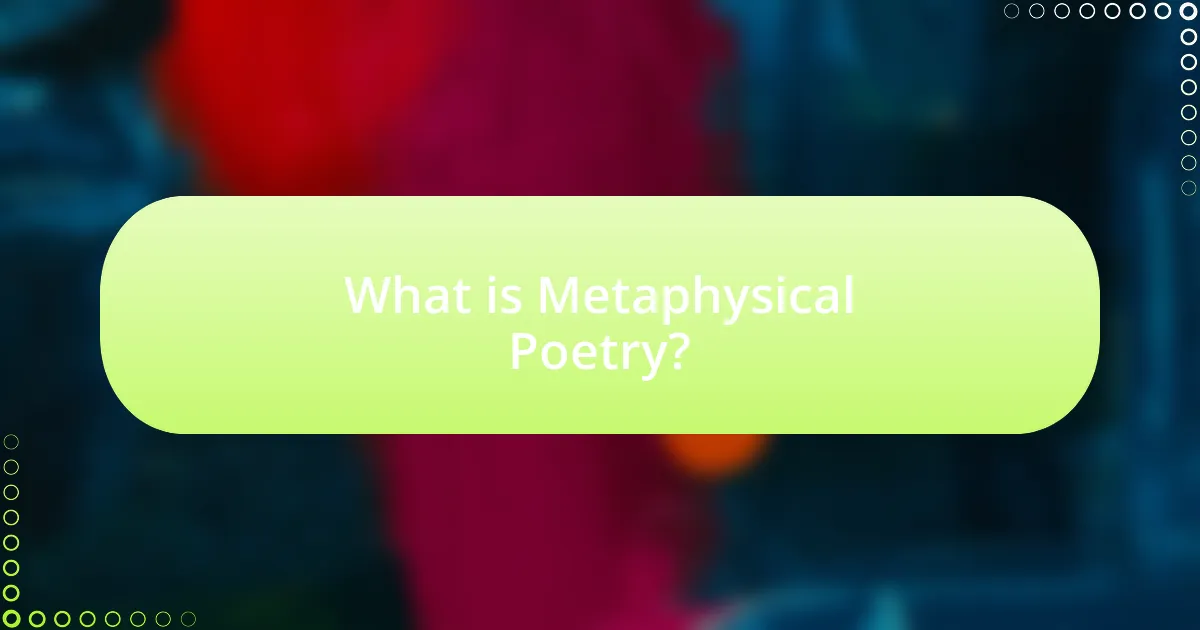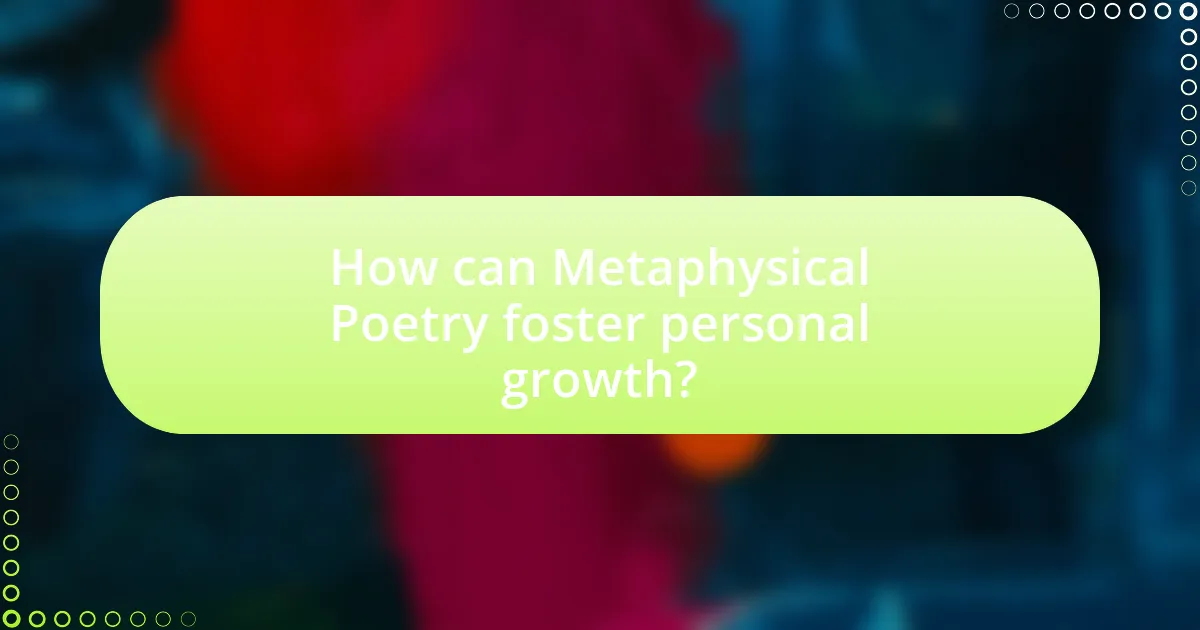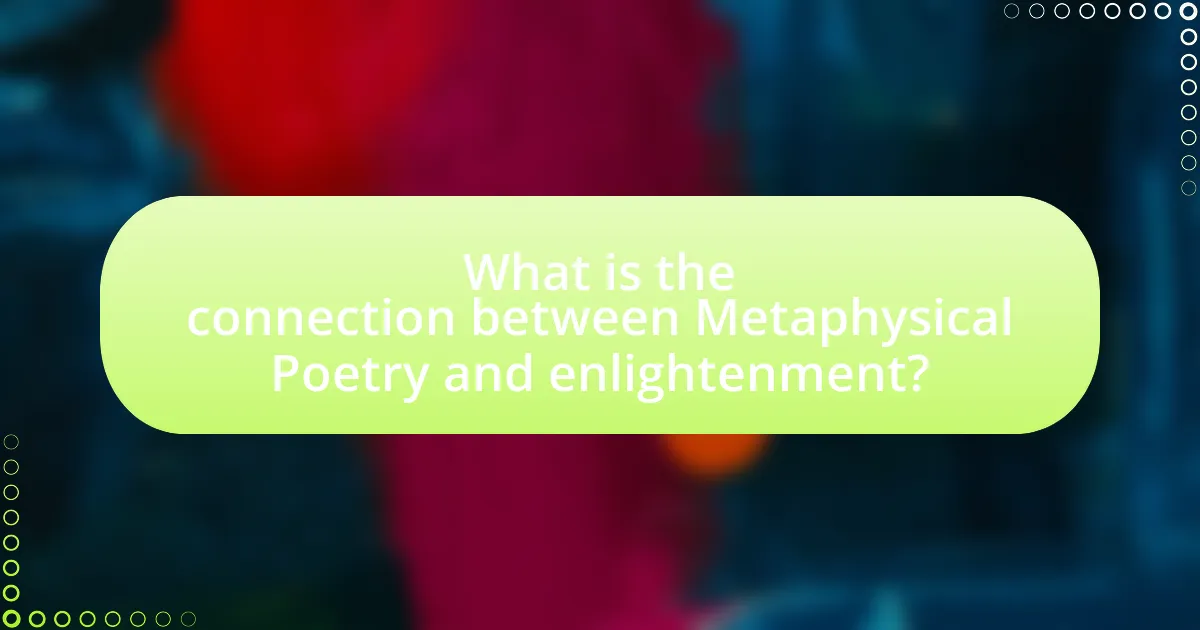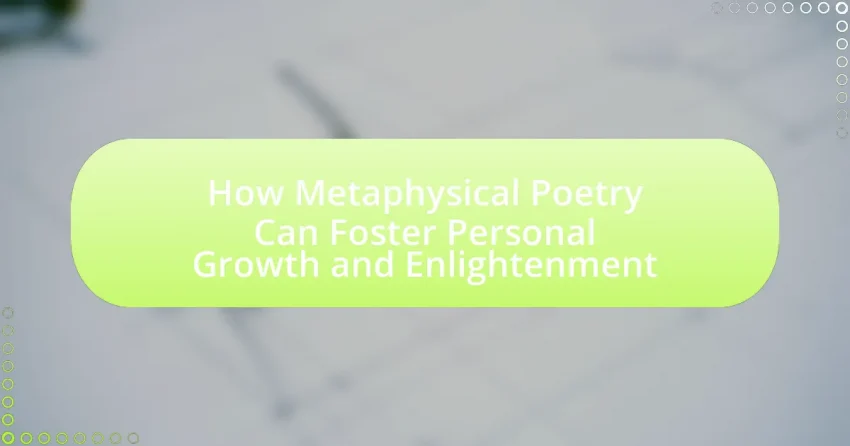Metaphysical poetry is a genre that emerged in the 17th century, characterized by intricate metaphors, philosophical themes, and emotional depth, with notable poets such as John Donne and George Herbert. This article explores how metaphysical poetry fosters personal growth and enlightenment by encouraging introspection, critical thinking, and emotional exploration through complex themes of love, existence, and spirituality. It highlights the significance of metaphysical poetry in literature, its historical context, and the psychological benefits derived from engaging with its intricate language and ideas. Additionally, practical tips for incorporating metaphysical poetry into daily life are provided, emphasizing its role in enhancing self-awareness and understanding of personal experiences.

What is Metaphysical Poetry?
Metaphysical poetry is a genre characterized by its use of intricate metaphors, philosophical themes, and emotional depth. This form of poetry emerged in the 17th century, with notable poets such as John Donne and George Herbert exemplifying its distinctive style. Metaphysical poets often explore complex ideas about love, existence, and spirituality through elaborate conceits and intellectual discourse, making their work rich in meaning and thought-provoking. The genre’s emphasis on the interplay between the physical and the metaphysical invites readers to engage in deeper reflection, thereby fostering personal growth and enlightenment.
How does Metaphysical Poetry differ from other poetic forms?
Metaphysical poetry differs from other poetic forms primarily through its use of complex metaphors, intellectual themes, and a focus on philosophical questions. This genre, exemplified by poets like John Donne and Andrew Marvell, employs intricate conceits that connect seemingly unrelated ideas, challenging readers to engage deeply with the text. Unlike traditional lyrical poetry, which often emphasizes emotion and beauty, metaphysical poetry prioritizes wit and reason, exploring themes such as love, existence, and spirituality in a manner that invites analytical thought. The distinctiveness of metaphysical poetry is further evidenced by its conversational tone and the blending of personal experience with universal truths, setting it apart from more straightforward poetic styles.
What are the key characteristics of Metaphysical Poetry?
Metaphysical poetry is characterized by its use of intricate metaphors, intellectual wit, and a focus on philosophical themes. This genre often employs conceits, which are extended metaphors that draw surprising connections between seemingly unrelated subjects, exemplified in the works of poets like John Donne. Additionally, metaphysical poetry frequently explores complex emotional states and existential questions, reflecting the inner turmoil and spiritual struggles of the human experience. The language used is often colloquial yet elevated, creating a unique blend that engages readers intellectually while provoking deep contemplation. These characteristics collectively contribute to the genre’s ability to foster personal growth and enlightenment by challenging readers to reflect on their own beliefs and experiences.
How do metaphysical themes manifest in poetry?
Metaphysical themes manifest in poetry through the exploration of abstract concepts such as existence, love, and the nature of reality, often employing complex imagery and philosophical inquiry. Poets like John Donne and George Herbert utilize metaphysical conceits, which are extended metaphors that connect seemingly disparate ideas, to delve into profound questions about the human experience and the divine. For instance, Donne’s poem “A Valediction: Forbidding Mourning” illustrates the connection between physical separation and spiritual unity, demonstrating how metaphysical themes can provoke deep reflection on personal relationships and existential questions. This approach not only enriches the poetic form but also encourages readers to engage in introspection and seek enlightenment through the contemplation of life’s mysteries.
Why is Metaphysical Poetry significant in literature?
Metaphysical poetry is significant in literature because it explores complex themes of love, existence, and spirituality through intricate metaphors and philosophical inquiry. This genre, exemplified by poets like John Donne and George Herbert, employs intellectual wit and emotional depth, challenging readers to engage with profound questions about the human experience. The use of conceits—extended metaphors that draw surprising connections—encourages critical thinking and self-reflection, fostering personal growth and enlightenment. For instance, Donne’s poem “A Valediction: Forbidding Mourning” illustrates the connection between physical separation and spiritual unity, prompting readers to contemplate the nature of love beyond mere physicality. This intellectual engagement and emotional resonance make metaphysical poetry a vital component of literary history and personal development.
What historical context shaped the emergence of Metaphysical Poetry?
The emergence of Metaphysical Poetry was shaped by the cultural and intellectual climate of the 17th century, particularly the Renaissance and the Scientific Revolution. This period fostered a blend of philosophical inquiry and artistic expression, leading poets like John Donne and George Herbert to explore complex themes of love, spirituality, and existence through intricate metaphors and intellectual rigor. The influence of humanism encouraged a focus on individual experience and emotion, while advancements in science prompted a reevaluation of traditional beliefs, allowing poets to engage with both the physical and metaphysical realms in their work.
How have notable poets contributed to its legacy?
Notable poets have contributed to the legacy of metaphysical poetry by exploring complex themes of existence, love, and spirituality, which resonate deeply with personal growth and enlightenment. For instance, John Donne’s use of intricate metaphors and philosophical inquiries in poems like “The Flea” and “A Valediction: Forbidding Mourning” encourages readers to reflect on the nature of relationships and the divine. Similarly, George Herbert’s works, such as “The Altar” and “Easter Wings,” emphasize the connection between the human experience and spiritual awakening, illustrating how personal struggles can lead to enlightenment. These poets’ innovative styles and profound insights have established a lasting influence on the genre, shaping its legacy as a vehicle for introspection and self-discovery.

How can Metaphysical Poetry foster personal growth?
Metaphysical poetry fosters personal growth by encouraging deep introspection and critical thinking. The intricate use of metaphors and philosophical themes in works by poets like John Donne and George Herbert prompts readers to explore complex emotions and existential questions. This engagement with profound ideas can lead to greater self-awareness and understanding of one’s beliefs and values. Studies in literary psychology indicate that reading poetry can enhance emotional intelligence, allowing individuals to navigate their personal experiences more effectively.
What psychological benefits can be derived from reading Metaphysical Poetry?
Reading Metaphysical Poetry can enhance psychological well-being by promoting introspection and emotional resilience. The intricate themes and complex imagery found in this genre encourage readers to explore deep philosophical questions, fostering a sense of self-awareness and personal insight. Studies indicate that engaging with poetry can lead to improved emotional regulation and empathy, as it allows individuals to connect with diverse perspectives and experiences. For instance, research published in the Journal of Poetry Therapy highlights that poetry reading can reduce anxiety and depression, providing therapeutic benefits through emotional expression and cognitive engagement. Thus, the psychological benefits of reading Metaphysical Poetry include enhanced self-reflection, emotional resilience, and improved mental health outcomes.
How does engaging with complex themes promote critical thinking?
Engaging with complex themes promotes critical thinking by challenging individuals to analyze, interpret, and evaluate multifaceted ideas. This process encourages deeper cognitive engagement, as individuals must navigate various perspectives and synthesize information to form coherent arguments. Research indicates that exposure to complex themes enhances cognitive flexibility, allowing individuals to adapt their thinking and approach problems from multiple angles, which is essential for critical analysis. For instance, studies in educational psychology show that students who engage with intricate literary works demonstrate improved analytical skills and a greater ability to articulate nuanced viewpoints.
In what ways can poetry serve as a form of self-reflection?
Poetry serves as a form of self-reflection by allowing individuals to explore their emotions, thoughts, and experiences in a structured yet creative manner. Through the use of metaphor, imagery, and personal narrative, poetry enables writers and readers to delve into their inner lives, facilitating a deeper understanding of their identities and feelings. For instance, metaphysical poetry often employs complex themes and philosophical inquiries that prompt individuals to question their beliefs and values, leading to personal insights. This reflective process is supported by studies indicating that expressive writing, including poetry, can enhance emotional processing and self-awareness, ultimately contributing to personal growth and enlightenment.
How does Metaphysical Poetry encourage emotional exploration?
Metaphysical poetry encourages emotional exploration by employing complex metaphors and intellectual arguments that provoke deep reflection on personal feelings and experiences. Poets like John Donne and Andrew Marvell utilize intricate imagery and philosophical themes to challenge readers to confront their emotions, often intertwining love, death, and spirituality. This approach not only stimulates cognitive engagement but also invites readers to examine their own emotional landscapes, fostering a deeper understanding of their inner selves. The use of paradox and wit in metaphysical poetry further enhances this exploration, as it compels individuals to reconcile conflicting emotions and thoughts, ultimately leading to personal growth and enlightenment.
What role do metaphors play in understanding personal experiences?
Metaphors play a crucial role in understanding personal experiences by providing a framework for individuals to interpret and articulate complex emotions and situations. They enable people to relate unfamiliar experiences to familiar concepts, facilitating deeper comprehension and reflection. For instance, metaphors can transform abstract feelings of grief into tangible imagery, making it easier for individuals to process their emotions. Research by Lakoff and Johnson in “Metaphors We Live By” illustrates that metaphors shape our perceptions and actions, demonstrating their significance in personal narrative construction and emotional understanding.
How can the exploration of love and existence in poetry lead to personal insights?
The exploration of love and existence in poetry can lead to personal insights by prompting deep emotional reflection and self-examination. Poetry often encapsulates complex feelings and existential questions, allowing readers to confront their own experiences and beliefs about love and life. For instance, John Donne’s metaphysical poems frequently explore the intertwining of love and existence, encouraging readers to reflect on their own relationships and the nature of their being. This engagement with poetic themes can catalyze personal growth, as individuals may gain clarity about their emotions and life choices through the lens of the poet’s insights.

What is the connection between Metaphysical Poetry and enlightenment?
Metaphysical poetry is intrinsically connected to enlightenment through its exploration of complex themes such as love, existence, and the nature of reality. This genre, characterized by its intellectual rigor and emotional depth, encourages readers to engage in profound self-reflection and critical thinking, which are essential components of enlightenment. For instance, poets like John Donne and George Herbert employed intricate metaphors and philosophical inquiries that challenge conventional perceptions, prompting readers to seek deeper understanding and personal growth. The use of paradox and wit in metaphysical poetry serves to stimulate intellectual curiosity, fostering a mindset conducive to enlightenment.
How does Metaphysical Poetry facilitate spiritual growth?
Metaphysical poetry facilitates spiritual growth by exploring complex themes of existence, love, and the divine through intricate metaphors and intellectual discourse. This genre encourages readers to engage deeply with philosophical questions, prompting introspection and self-reflection. For instance, John Donne’s poem “A Valediction: Forbidding Mourning” uses the metaphor of a compass to illustrate the spiritual connection between lovers, suggesting that true love transcends physical separation. Such explorations challenge individuals to contemplate their own beliefs and relationships with the universe, fostering a deeper understanding of their spiritual selves.
What themes in Metaphysical Poetry promote a deeper understanding of existence?
Themes in Metaphysical Poetry that promote a deeper understanding of existence include the exploration of love, the nature of reality, and the relationship between the physical and spiritual realms. These themes encourage readers to reflect on the complexities of human emotions and the interconnectedness of life. For instance, John Donne’s use of paradox and wit in poems like “The Flea” illustrates the intricate nature of love and desire, prompting contemplation on the essence of relationships. Additionally, the theme of mortality, as seen in Andrew Marvell’s “To His Coy Mistress,” invites readers to consider the transient nature of life and the urgency of existence. Such thematic elements foster introspection and a greater awareness of one’s place in the universe, ultimately leading to personal growth and enlightenment.
How can poetry inspire a quest for meaning and purpose?
Poetry can inspire a quest for meaning and purpose by evoking deep emotional responses and prompting introspection. Through its use of metaphor, imagery, and rhythm, poetry encourages individuals to explore complex themes such as existence, love, and mortality. For instance, John Donne’s metaphysical poems often challenge readers to reflect on their spiritual beliefs and the nature of reality, fostering a deeper understanding of their own lives. This engagement with profound questions can lead to personal growth and enlightenment, as individuals seek to find their own answers and purpose in the world.
What practices can enhance the experience of Metaphysical Poetry?
Engaging deeply with Metaphysical Poetry can be enhanced through practices such as close reading, reflective journaling, and group discussions. Close reading allows individuals to analyze the intricate language and complex themes, fostering a deeper understanding of the poet’s intent and emotional resonance. Reflective journaling encourages personal connections to the themes, enabling readers to explore their own thoughts and feelings in relation to the poetry. Group discussions provide diverse perspectives, enriching the interpretation and appreciation of the poems. These practices collectively promote a more profound engagement with the text, facilitating personal growth and enlightenment through the exploration of metaphysical concepts.
How can journaling alongside poetry reading deepen personal insights?
Journaling alongside poetry reading can deepen personal insights by facilitating reflection and emotional processing. Engaging with poetry often evokes strong feelings and thoughts, and journaling allows individuals to articulate and explore these responses in a structured manner. Research indicates that expressive writing, such as journaling, enhances self-awareness and emotional intelligence, which are crucial for personal growth. A study published in the Journal of Clinical Psychology found that individuals who engaged in expressive writing reported greater clarity in their thoughts and feelings, leading to improved mental health outcomes. Thus, the combination of poetry’s emotional depth and the reflective practice of journaling creates a powerful tool for gaining deeper personal insights.
What techniques can be used to analyze and interpret Metaphysical Poetry effectively?
To analyze and interpret Metaphysical Poetry effectively, one can employ techniques such as close reading, thematic exploration, and historical context analysis. Close reading involves examining the poem’s language, structure, and imagery to uncover deeper meanings and connections. Thematic exploration focuses on identifying central themes, such as love, death, and spirituality, which are prevalent in Metaphysical works. Historical context analysis situates the poetry within its time period, considering the philosophical and cultural influences that shaped the poets’ perspectives. These techniques are validated by the complexity and layered meanings often found in Metaphysical Poetry, as demonstrated in the works of poets like John Donne and George Herbert, who intricately weave personal and universal themes through their unique stylistic choices.
What are practical tips for incorporating Metaphysical Poetry into daily life?
To incorporate Metaphysical Poetry into daily life, individuals can start by reading a poem each morning to inspire reflection and set a thoughtful tone for the day. Engaging with the complex themes and intricate language of poets like John Donne or George Herbert can enhance critical thinking and emotional awareness. Additionally, journaling responses to these poems can deepen personal insights and foster a connection to the metaphysical concepts explored in the texts. Regularly discussing these poems with others can also create a community of shared exploration, enriching the understanding of the poetry’s relevance to personal growth and enlightenment.
